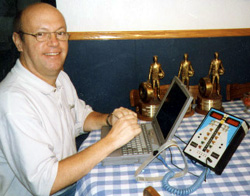
Seriously… it costs that much for traction?
This month I won't bash a track, a sanctioning body or someone's dumbass decision. Rather, I want to talk about "preserving the sport of drag racing" and a couple things that track owners (in particular) and racers should consider.
It seems every local track is being judged by how much traction or grip it has for a bracket race. That is simply too bad in my opinion. We have all started to overlook courteous employees, consistent and up to date timing equipment, and having a fun and relaxing weekend before we go back to the weekly grind of working. When a track is prepped to the max and anything on the planet can't spin a tire, for some reason racers have started to think that is a necessity for a bracket race. WHY? Have we forgotten how to adjust suspensions, change the ignition timing, or add some weight in the rear of the car?
While it is much easier to race on a track that has been sprayed with glue for the entire quarter mile, is it really more fun? The winners have changed from guys who can drive and adapt their cars to the track to the guys who decided to buy the fastest, baddest ride they can get and then rely on the track to handle the power or they will bitch about the traction and threaten to take their toys and go to another sandbox and play. (If you are from Yorba Linda that means they will support another track). That puts a fear into the track operator that he will lose customers if his track hasn't received national event-type prep so he does it week after week, hundreds of dollars after hundreds of dollars.
What price does having great traction put on the track?
Have you racers even considered what that type of track prep costs the track and that the cost of doing so MUST BE ADDED TO ENTRY FEES? The cash that track prep eats up has to come from somewhere, and the biggest source of revenue is entry fees and pit passes (that means us!). Drums of quality traction compound cost anywhere from $600 to nearly $1,000 a drum depending on freight, quantity ordered, etc. Let's use a number in the middle and say it's $750 for 54 gallons.
I talked to a couple of track managers and a typical weekend (let's say a Friday night test/tune and Saturday and Sunday bracket races) will use about 50 to 60 gallons of the traction compound and, depending on how the track manager dilutes his mixture, they can easily use 30 to 50 gallons of methanol as the thinning agent. The alcohol also makes the "glue" flash-off quicker and the mixture depends a lot on air temperature and humidity.
So your local track spends $750 on traction compound, a couple hundred on some powdered rosin and lacquer thinner to clean up small oil spills. Round it off and your bracket track just spent $1,000 a weekend for traction that racers will have to pay for, one way or the other.



